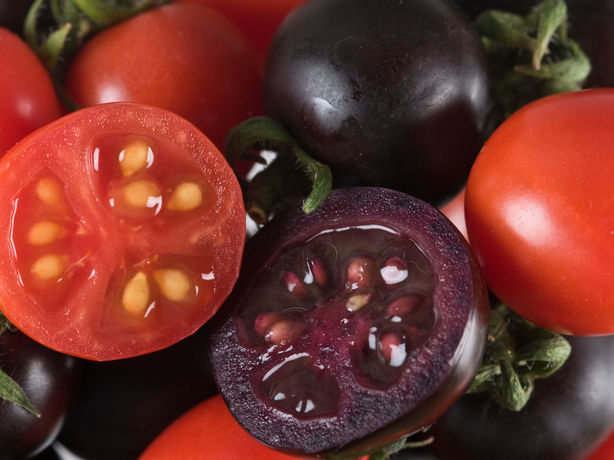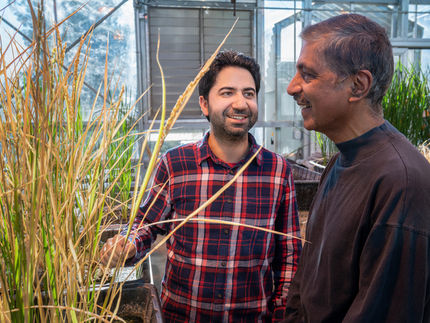Norfolk Plant Sciences welcomes major milestone decision on purple GM tomatoes
A spinout company’s dream of bringing genetically modified (GM) purple tomatoes to the gardens and plates of American home growers has moved a crucial step closer following a decision by United States regulators.

GM Purple Tomatoes
John Innes Centre
Norfolk Plant Sciences Ltd welcomed the decision by the United States Department of Agriculture (USDA) which means US home growers should be able to purchase seeds and grow the nutritionally enhanced high-anthocyanin purple tomato from spring 2023.
A Regulatory Status Review (RSR) issued on Wednesday September 7 states that the USDA Animal and Plant Health Inspection Service (APHIS), “has determined that [Norfolk Plant Sciences’] modified tomato is unlikely to pose an increased plant pest risk relative to its comparator.”
According to this decision, the purple tomato is no longer subject to the regulations limiting “Movement of Organisms Modified or Produced through Genetic Engineering.”
NPS is a spinout company from the John Innes Centre and The Sainsbury Laboratory two world-leading research institutes based at Norwich Research Park. The company was established by Professors Cathie Martin and Jonathan Jones as the UK’s first GM crop company. Its aim is to find ways of commercialising their research into plants with enhanced health-giving compounds.
The decision follows a long wait for Professor Martin who developed the anthocyanin rich purple tomato in 2008 by engineering a precise genetic “on switch,” derived from an edible flower.
“This is fantastic, I never thought I would see this day. We are now one step closer to my dream of sharing healthy purple tomatoes with the many people excited to eat them,” she said.
“The bittersweet thing is that the tomatoes will be on sale in America and not the UK as well. But the plus side is that by focusing on home growers we will be consumer oriented, and we will be able to get feedback and interest needed to develop other products.” she said.
Hundreds of people in the US have already expressed interest via the Big Purple Tomato website in buying tomatoes and seed once they become available.
Professor Jonathan Jones of The Sainsbury Laboratory said: “When Cathie and I founded NPS nearly 15 years ago to bring to market health-promoting, genetically enhanced purple tomatoes, invented in the UK, we never thought it would take so long to obtain regulatory approval. This is a red-letter day for crop improvement, with approval of a beneficial product by USDA, after careful scrutiny of a detailed information dossier that describes its properties.
“We also look forward to sensible regulatory frameworks for such products in the UK, and effective methods to protect our major crops from disease, using genetics instead of chemistry.”
Anthocyanins are antioxidants associated with a host of health benefits and are important to an anti-inflammatory diet.
Independent studies show that antioxidants and anthocyanins can reduce incidence of cancer, improve cardiovascular function, and improve health and well-being. Lab studies also suggest these healthy compounds could help alleviate irritable bowel syndrome.
Nathan Pumplin, CEO of Norfolk Plant Sciences’ US-based commercial business, stated, “this decision shows how the updates to APHIS’s regulatory framework will enable independent scientists and small companies to develop and compete on the market with better products, to the benefit of consumers and climate. This decision is a big milestone, which brings us much closer to a commercial launch of purple tomatoes. We are optimistic that we can begin limited distribution of purple tomatoes in the US in 2023.”
Although purple-skinned tomato varieties exist, they do not accumulate useful levels of these healthy compounds within the fruit flesh.
While it is possible to use nutritional supplements to increase intake of these compounds, there is increasing evidence to show that they work much better when consumed within foods.
Chronic diseases are a worldwide problem, killing twice as many people as infectious diseases. The World Health Organisation states that improved diet is one of the major changes that people can make to help prevent these diseases.


























































